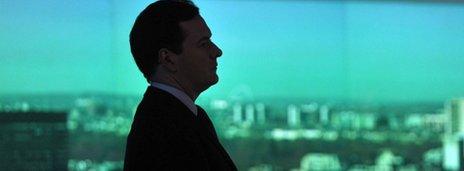Budget 2012: George Osborne, the political chancellor
- Published

George Osborne is the youngest chancellor since Sir Winston Churchill's dad was appointed in 1886. He was just 38 when he took the job after the last general election.
He is a man - I've discovered - who is variously described as "the submarine", having the look of "a powdered French aristocrat", and being a metropolitan sceptic about the Big Society.
He was brought up in central London. He is the heir to the Osborne and Little wallpaper fortune. One day he will be a baronet. He is a rich man. But close observers say it is not his wealth that marks him out as different amongst Conservatives.
"What distinguishes him from a lot of other privileged Tories, and particularly David Cameron, is not so much class as geography," says Janan Ganesh from The Economist, who is writing a biography of Mr Osborne.
"He grew up in the heart of the metropolis, whereas Cameron and your typical privileged Tories come from the rural home counties. And that really has shaped his world view. He is far more socially liberal than you might expect from a typical Tory.
"He'll vote for the most liberal option on things like gay rights and abortion. And aside from that he is a bit more sceptical about the communitarian conservatism of rural Tories. George Osborne was always a little bit wary of it."
As Steve Hilton, the prime minister's adviser seen as the driving force behind the Big Society leaves Downing Street, will George Osborne's voice as a strategist grow louder, more important? It is a role, his friends say, he loves.
"If you sit with George one of his traits is to mimic other people. Other politicians for example - he has an excellent Tony Blair, an excellent Gordon Brown, and he will also mimic broadcasters," former Conservative adviser and now Times writer Daniel Finkelstein tells me.
"It's not just a way of entertaining people, it is a way of thinking. He thinks how something will play out. He understands how politics works and how the media deals with issues and that will influence the way he will think through a problem and the way he expects people politically to react to a problem," he adds.
Let's, though, look at some of the adjectives George Osborne's critics like to attach to him.
"Macho." "Arrogant." "Sneering." The Conservative backbencher Claire Perry, who introduced herself to him at a Tory fundraising event and was later hired by him, instantly dismisses the critics as opponents resorting to caricature who don't really know him.
"I won't use any Anglo Saxon to deal with that, but come on!" she says. Instead, she describes her former boss as a rounded man who inspires huge loyalty from those around him.
"I think one of the things people don't realise about George is that his wife is a very successful author in her own right. There were very strong female voices in the shadow treasury team and now in the Treasury. And he was completely happy working with and taking advice from women."
But in politics perception can be reality, as even those who admire him acknowledge.
In 2008, the Spectator and Telegraph writer Charles Moore wrote: "His appearance is still against him when he tries to share the nation's economic pain. Something about his black curls and pale face make him look like a powdered French aristocrat in 1790."
Does he still hold to that view?
"Part of it is a sort of aloof quality. My comparison was with him being a French aristocrat and therefore being scared of the mob. He might be wheeled off to the guillotine. I just thought of that because of something about his expression, and his hair and his face.
"He has now become more of a clearly professional politician. In fact he is a very professional politician. But i think that he hasn't got the common touch and wouldn't claim to have."
And this has led George Osborne to pick up something of a nickname at Westminster.
"So this term has emerged, 'submarine', to describe George Osborne's approach to face time with the public. He will do the big set piece events but aside from that he is like a submarine, he will go underwater, focuses on his job, it does suggest a certain amount of self awareness," Janan Ganesh from The Economist says.
"Privately he tells his advisers I know I will never be a man of the people, so rather than making a fool of myself in the attempt, why not focus on what I am good at?"
And all of those I've spoken to openly wonder if that awkwardness on the public stage could stand in the way of him ever becoming prime minister.
Right now though, George Osborne is a chancellor with both independent political clout and Downing Street's ear.
He may revel in politics as strategy, rather than politics as showbiz. But he's no less powerful for it.